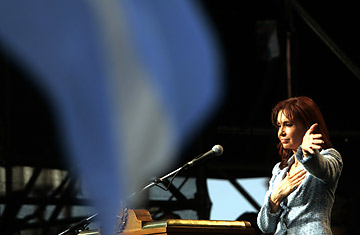
Argentina's President Cristina Fernandez de Kirchner speaks to supporters during rally by trade unions and social groups to back her in Buenos Aires April 1, 2008.
The new president of Argentina and her country's farmers have been at war. Though a 30-day truce has temporarily ended the dispute, Argentina's politics have become harshly confrontational. Just a bit more than 100 days into Cristina Fernandez's presidency, Argentina has witnessed a spectacle of demonstrations and counter-demonstrations, of rhetoric and bombast, all ominously reminiscent of the dark days of previous presidencies and bad economic times. Cristina, as her followers like to call her, has just seen her honeymoon come to a dead halt; she is now presiding over a deeply divided country.
Fernandez's instinct has been to meet force with force. In a show of muscle in the face of a 21-day farm strike that caused food shortages and affected agricultural exports, Fernandez spoke before a mass rally of supporters organized by her Peronist party on Tuesday afternoon, lashing out against large landholders, the press and what she claimed was a plot to unseat her government only 102 days after taking office. "Never before in such a short time have there been so many attacks against a government arisen from the popular vote," she said, adding that she had committed two sins: being democratically elected and "being a woman." She demanded that striking farmers lift roadblocks across the country that were choking food supplies and affecting trade with neighboring countries.
The farmers, in response, organized a massive rally, before announcing a 30-day truce in the sometimes violent street confrontations. Still, they continued to voice their outrage over a new export tax on soybeans, which they say effectively limits how much they can earn from their produce. Over their 21-day rebellion, the farmers had received the wide support of Argentina's middle class, which has been hit by inflation and angered by the government's alleged rigging of official inflation figures to disguise its true rise. In cities across the country, supporters of the tax rebellion took to the street last week banging pots and pans in scenes reminiscent of the wildfire protests that brought down five presidents in a row after Argentina defaulted on its foreign debt six years ago. The protests turned violent a week ago when supporters of the president wielding sticks attacked supporters of the farmers who congregated in front of the presidential palace in Buenos Aires.
Fernandez, who succeeded her husband Nestor Kirchner as President last December, had been riding a five-year economic boom until the farmers brought a dramatic stop to her political honeymoon period. She compared the striking farmers to the business leaders behind Argentina's bloody 1976-83 dictatorship. "This time they haven't come accompanied with tanks, but they have put in place a lockout against the people and a lockout on information," she said at the demonstration organized by her Peronist party.
At the core of the discontent was a decision by Fernandez three weeks ago to raise export taxes for soy from 35% to 44% though a sliding scale of tariffs. Other observers have called the soy tax and efforts to ban exports of some farm products as misguided attempts to retain the supply of basic goods in Argentina. The government's argument is that the large-scale export of products like soy cause local shortages and drive up the price of food in Argentina.
The protesting farmers (the organizers claim as many as 150,000 took part) blocked international routes used for trade with neighboring Brazil, Paraguay and Chile, leading the government to threaten police action to clear the roads if necessary. The strike forced many supermarkets and butchers to close their meat counters, a dramatic move in a land famous for its abundant and tasty beef. Fruit and vegetable prices rose and exports of cereals and oils have also been affected.
President Fernandez insisted that her reforms were part of "profound measures to redistribute income" that she considers central to her government program. Nevertheless, in an attempt to defuse the protests, Fernandez and her Economy Minister Martin Lousteau on Monday announced a rollback on the tariff for small producers. Lousteau said he hoped that the new measures for small farmers (80% of producers. who generate 20% of the soy and sunflower crops) would be enough to satisfy their demands and that "supplies and prices can go back to normal." Other measures included cheap loans for farmers and the reopening of wheat exports.
That did little to satisfy the farmers and their sympathizers. Even though they called off the blockades and put their protests on a 30-day abeyance, it was clear their tax rebellion had become a national protest against the concentration of power in presidential hands. Farm leader Alfredo De Angelis told a crowd of 20,000 in the northern province of Entre Rios: "Mrs President, the provinces also exist."
Fernandez had mobilized to prove she could effectively play the populist card as well as the farmers. On Tuesday, downtown Buenos Aires went into a traffic gridlock as Cristina supporters poured into the historic Plaza de Mayo, scene of historic rallies by Juan and Eva Peron, the founders of her party, over 60 years ago. Peronist governors, mayors, labor leaders and legislators piled onto a gigantic stage with large video screens, reminiscent of a rock concert, as thick columns of workers carrying pro-Cristina banners covered the square. But, says political analyst Rosendo Fraga, "filling the Plaza de Mayo with militant supporters is not going to help bring about dialogue with the farmers. This will only raise political tensions. This only underlines the seriousness of the crisis. It is a sign of weakness more than strength."
